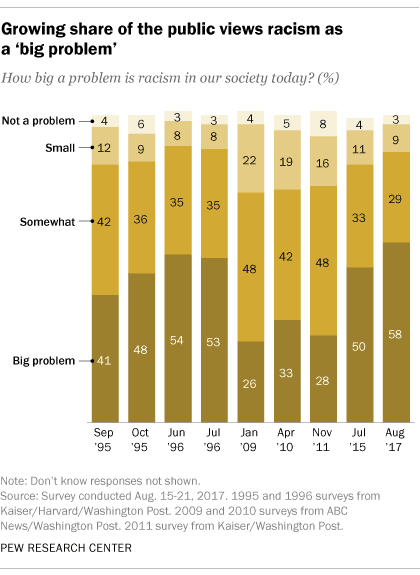From #MAGA to #MeToo: A Look at U.S. Public Opinion in 2017
Michael Dimock, Pew Research Center, December 20, 2017
In his first year as U.S. president, Donald Trump represented a clear break in style and substance from his predecessor, Barack Obama — and from many of the chief executives who came before them. The businessman-turned-politician upended Washington with unrestrained rhetoric and an “America First” agenda that included renegotiating international trade pacts, withdrawing from a worldwide climate change agreement and curtailing immigration into the United States.
{snip}
Trump’s contentious first year was among the defining stories of 2017. But beyond the shifts in policy and approach that accompanied the transition between presidential administrations, the year revealed other important trends shaping American society.
{snip}
Racial issues continued to draw national attention. The removal of Confederate statues by local governments in the South and elsewhere became a flashpoint as Americans debated whether the statues perpetuated racism or merely reflected a common history. In August, a white nationalist rally in Charlottesville, Virginia, led to violent clashes in the city’s streets, including the death of one person and the injury of 19 others when a car driven by an alleged white nationalist sped into a crowd of counterprotesters.
Discussions of race extended to other venues as well. When the NFL season began in the fall, some players protested perceived racial injustice and police mistreatment of blacks by kneeling during the national anthem, a move that provoked anger among those who saw the protests as disrespectful. Trump was among those who criticized the players; indeed, he was a frequent commenter on the nation’s racial controversies.
Against this backdrop, the public expressed rising concern about race relations. In an August survey conducted shortly after the violence in Charlottesville, nearly six-in-ten Americans said they viewed racism as a big problem in U.S. society — up 8 percentage points from 2015 and roughly double the share who held this view in November 2011. But there were stark divisions along racial and partisan lines. For example, Democrats and Democratic-leaning independents were far more likely than Republicans and Republican leaners to see racism as a big problem. A similar trend was evident on a separate question about whether white people in the U.S. benefit from societal advantages that blacks do not have: Democrats and Democratic leaners were much more likely than Republicans and GOP leaners to say whites do benefit from such advantages.
{snip}
Large partisan gaps were evident across many of the issues the Center asked about in 2017, from Trump’s proposed border wall with Mexico to the threat posed by global climate change.
{snip}
In some cases, partisan shifts in opinion were dramatic. Amid Trump’s persistent criticisms of CNN and other media outlets as “fake news,” for example, partisan differences over the role of the press as a “watchdog” were wider than in more than three decades of Pew Research Center surveys. In a March survey, Democrats were roughly twice as likely as Republicans to say criticism from news organizations keeps political leaders from doing things that shouldn’t be done (89% versus 42%). When the Center last asked this question in January and February 2016, about three-quarters of both Democrats (74%) and Republicans (77%) said this.
{snip}
In both parties, majorities of Americans also agreed on some other perceived security threats facing the U.S., from cyberattacks launched by other countries to the terrorist group known as the Islamic State, which again claimed high-profile attacks in places including Manchester, England; Barcelona, Spain; and New York City, which suffered its deadliest terrorist attack since Sept. 11, 2001.
{snip}
















